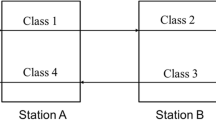Abstract
We study the stability of multiclass queueing networks under the global FIFO (first in first out) service discipline, which was established by Bramson in 2001. For these networks, the service priority of a customer is determined by his entrance time. Using fluid models, we describe the entrance time of the most senior customer in the networks at time t, which is the key to simplify the proof for the stability of the global FIFO queueing networks.
Similar content being viewed by others
References
Bramson, M. Instability of FIFO queueing networks. Annals of Applied Probability, 4: 414–431 (1994)
Bramson, M. Convergence to equilibria for fluid models of FIFO queueing networks. Queueing Systems, 22: 5–45 (1996)
Bramson, M. Convergence to equilibria for fluid models of head-of-the-line proportional process sharing queueing networks. Queueing Systems, 23: 1–26 (1996)
Bramson, M. Stability of earlist-due-date, first-served queueing networks. Queueing Systems, 39: 79–102 (2001)
Chen, H., Zhang, H. Stability of multiclass queueing networks under FIFO service discipline. Mathematics of Operations Research, 22: 691–725 (1997)
Chen, H., Zhang, H. Stability of multiclass queueing networks under priority service disciplines. Operations Research, 48: 26–37 (2000)
Dai, J.G. On the positive Harris recurrence for multiclass queueing networks. Annals of Applied Probability, 5: 49–77 (1995)
Dai, J.G., Weiss, G. Stability and instability of fluid models for re-entrant lines. Mathematics of Operations Research, 21: 115–134 (1996)
Lu, S.H., Kumar, P.R. Distributed sheduling based on due dates and buffer priorities. IEEE Trans. Autom. Control, 36: 1406–1416 (1991)
Rybko, S., Stolyar, A. Ergodicity of stochastic processes that discribe the functioning of open queueing networks. Problem of Information Transmission, 28: 3–26 (1992) (in Russian)
Seidman, T.I. First come, first served can be unstable! IEEE Trans. Automat. Control, 39: 2166–2171 (1994)
Stolyar, A. On the stability of multiclass queueing networks. In: Proc. 2nd Conf. on Telecommunication Systems-Modeling and Analysis, Nashiville, 1994, 1020–1028
Author information
Authors and Affiliations
Corresponding author
Additional information
Supported by the Research Grants Council of Hong Kong (RGC No. PolyU 5318/07E)
Rights and permissions
About this article
Cite this article
Yang, Jk. A Simple proof for the stability of global FIFO queueing networks. Acta Math. Appl. Sin. Engl. Ser. 25, 647–654 (2009). https://doi.org/10.1007/s10255-009-8819-5
Received:
Revised:
Published:
Issue Date:
DOI: https://doi.org/10.1007/s10255-009-8819-5




